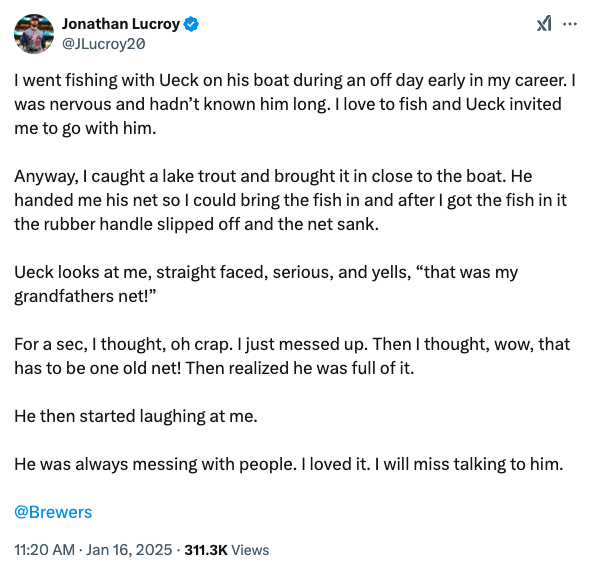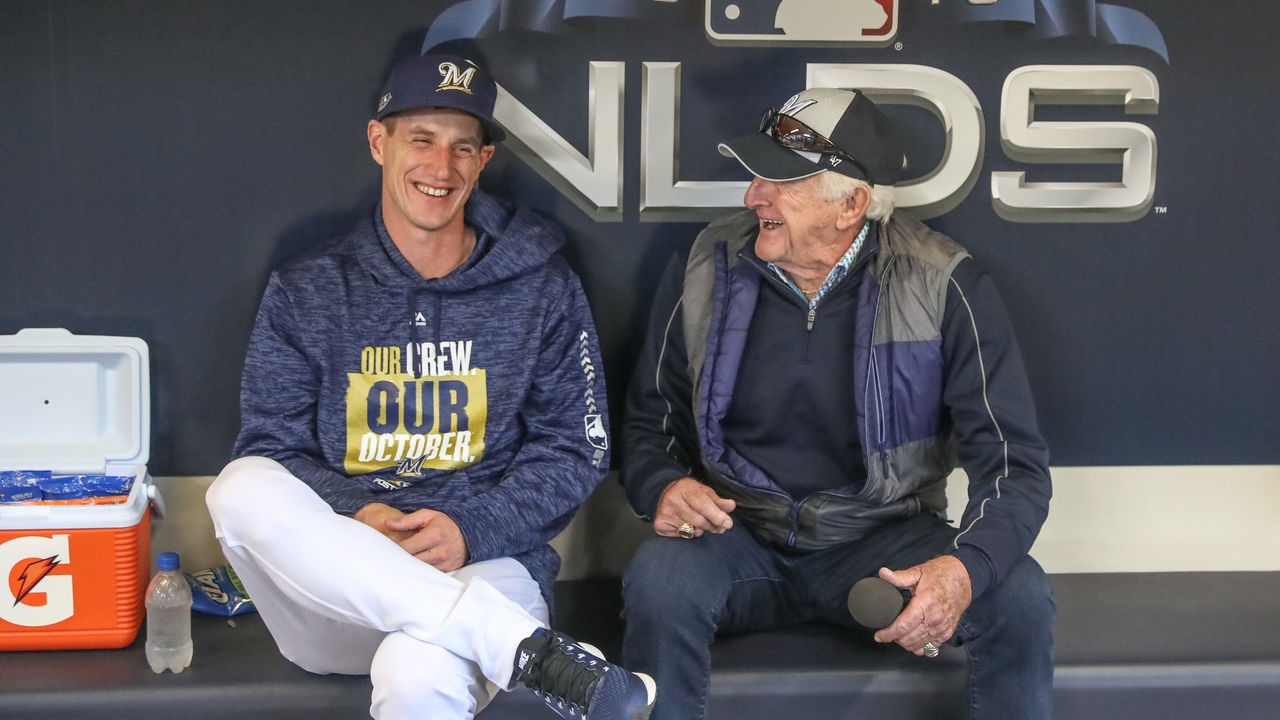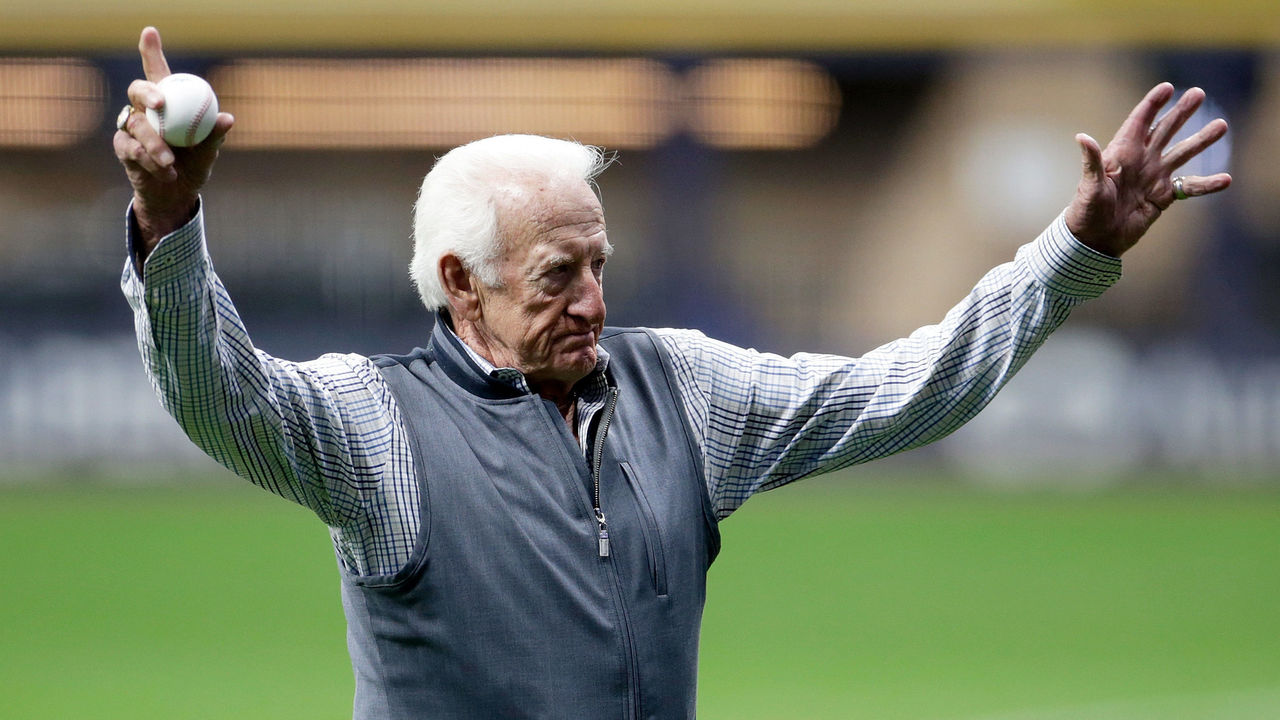Colleagues reflect on the incredible life of Bob Uecker
Bob Uecker completed his forgettable six-year major-league career with an even .200 batting average.
"Sporting goods companies pay me not to endorse their products," he once quipped.
He called his hometown Milwaukee Brewers games for 54 consecutive years until his death at age 90 on Thursday. That run marked the second-longest streak of calling a single team's games in the sport's history, trailing only Kansas City Royals broadcaster Denny Matthews.
Despite working in a small market, despite a modest playing career, Chicago Cubs and ESPN play-by-play voice Jon "Boog" Sciambi noted how remarkable Uecker's reach was. Uecker became famous before fans could listen to out-of-market broadcasts and social media.
"For a stretch of time, he was one of the most famous people in the country," marveled Sciambi. "He has the most appearances ever on the Johnny Carson show, I believe, and people didn't have access to him."
Bob Uecker makes Johnny Carson crack up on "The Tonight Show"! (1984)
— Baseball by BSmile (@BSmile) January 16, 2025
⚾️ RIP "Mr. Baseball" #MLB #Baseball #Legend #RIPBobUecker pic.twitter.com/O8pwvCQUYw
Uecker's superpower that attracted so many people to him? "Authenticity," Sciambi said.
He became beloved by being himself, combining his love of baseball with self-effacing humor and deadpan wit.
Sciambi first became familiar with Uecker through his Miller Lite beer commercials. Others knew him from his work on network baseball telecasts, as a talk show staple, or as an actor, best known for his role as announcer Harry Doyle in the three "Major League" films. In many ways, Uecker was the star of that film. Anyone who has seen the movie can recall Uecker saying fictional Cleveland reliever Rick "Wild Thing" Vaughn "tried the corner and missed" and was "just a bit outside" as a pitch whizzed to the backstop.
The magic of Major League doesn’t exist without Bob Uecker. His commentary was perfect and no other voice could have filled that role. A legendary commentator whose voice will be missed forever. Rest easy Bob. pic.twitter.com/ECvPcpknL6
— Shooter McGavin (@ShooterMcGavin_) January 16, 2025
But unlike many, Sciambi got to know Uecker as a colleague.
And what he saw was someone who treated everyone warmly and equally.
"A little thing would be I would walk in his booth (pregame), and he'd be down a level, and I would just say 'Hey.' He'd turn and look at me, and as I'd see his face, my face would light up," said Sciambi, who worked in the NL Central for years with Uecker. "And the thing that was so cool for me is that his face would light up, too."
One thing that always struck Sciambi was how much Brewers players loved Uecker, which is unusual for a member of the media - even the local broadcast crew.

"For the Brewers, he was like a player," Sciambi recalled. "They revered him. Just go on Twitter and look at Christian Yelich postgame after Game 3 (NL wild-card round). He gets choked up. Because right before Yelich's postgame scrum, he's just talked to Uecker, and he feels bad because Uecker is such a die-hard Brewers guy. He's also wondering if he's ever going to see him again."
Bob Uecker circled the room tonight, starting with Devin Williams. Then he gathered with a group of players in back for hugs and “see you next seasons.” If you’re wondering how much these guys love him, see Christian Yelich. pic.twitter.com/GaidgFlwV8
— Adam McCalvy (@AdamMcCalvy) October 4, 2024
He was so popular that the Brewers' players voted him a full playoff share - $123,000 - in 2018.
"It was his ability to make guys laugh and relate," Sciambi said. "I know (former Brewers manager) Craig Counsell had a great relationship with him. Treasured it."

Chicago White Sox play-by-play voice Len Kasper learned a lot from Uecker, whom he knew for more than 30 years; from the time he graduated from Marquette University in Milwaukee to working for the Brewers' flagship radio station. He even called some games with Uecker.
"I am told, for his Hall of Fame speech, he had nothing written," Kasper recalled. "It was one joke after the next, after the next, after the next. It is the greatest Hall of Fame speech ever just because it was just so entertaining.”
19 minutes of legendary Bob Uecker calls and moments 💙 pic.twitter.com/2gcQK2Mtzf
— MLB (@MLB) January 16, 2025
He was baseball's storyteller, an important skill given the amount of dead time during games.
"It's also the delivery," Kasper said. "You can write down his jokes, and they are funny, but when he delivers them … It's not as funny if (he) doesn't tell it."
Kasper says Uecker's cough button - which broadcasters use to briefly kill their mic to save their audience from hearing their throats cleared - should go into the Hall of Fame. Uecker often employed it to have off-air conversations with whoever was visiting him in the booth.
"It never failed for Bob," Kasper recalled. "He often did two broadcasts at once, depending on who was in the booth. One was on the air, and the other was off the air. I witnessed it many times."
Uecker had a one-of-one personality and ability to tell stories. But there are lessons from Uecker that Kasper incorporates into his own call of games.

"Three things stand out. No. 1 is to have fun. Bob did that better than anyone. When you are doing local big league baseball, people want to feel like you are their friend. They do not want you to take yourself too seriously. Bob would never have been accused of that," Kasper said.
"No. 2 was, like many from his generation, it was, 'Where is the ball, what is the score, what is the count, what is the base-running situation?' It's the nuts and bolts, as basic as you can get. When you are doing radio, you have to repeat (that) every three-to-four minutes.
"We get caught up in the statistics and strategy too much. I think Bob was very good to 'keep it simple.' You always knew what was happening in that moment."
For all of his fame and accolades, Kasper said Uecker loved calling Brewers games more than anything.
Kasper jokes that just like there are NFL coaching trees, there's a tree for Uecker's method of scoring games.
Uecker would share his scorebook with fellow broadcasters, who might be filling in for him a game, or an inning, but you had to learn to score like Uecker.
Keep it simple: Kasper still scores extra base hits like Uecker did. A double is simply written as a "2."
He was simple in other ways, too. For as great of a storyteller as Uecker was, Kasper said he also knew when not to speak.
"He created a lot of space in his play-by-play … knowing when to let the sounds of the crowd and ballpark take over. He had a very good feel. That's hard when you are paid for a living to speak."
Sciambi believes Uecker doesn't get enough credit for the quality of his play-by-play call and said he was still razor-sharp in his final season.
Sciambi and Uecker also became close because ALS had touched each of their lives. Sciambi lost a friend to the disease and helps raise funds to fight it. Uecker's daughter, Leeann, died from ALS in 2022.
They'd regularly exchange texts about all sorts of things. One of the last interactions they had was an accidental dial, which Uecker apologized for in a text explaining one of his grandkids had his phone.
Sciambi recalled another fairly recent interaction he had with Uecker in which the baseball icon explained what he wanted to see in a final bobblehead depicting him.
"I know this is going to sound morbid, but this is him to a T," Sciambi said. "He said that he wanted his final bobblehead to be him in a coffin, and the way it works is, is he pops out of the coffin, and it plays his home run call: 'Get up, get up, get outta here!' … Then the coffin closes, and he goes back in, and he says: 'And gone.'
"He was incredible. He was fun and funny, and he was kind. … He was just larger than life. I loved him."
Travis Sawchik is theScore's senior baseball writer.